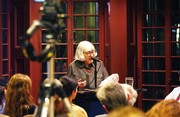New York Author takes historical approach
Writers House hosts readings from gritty novel chronicling Depression-era
The Daily Pennsylvanian
March 21, 2006

-
Author Cynthia Ozick gives a reading of her newest book at the Kelly Writers House. Ozick said the dark work was inspired in part by Winnie the Pooh.
Photo by Andrew Migdail/The Daily Pennsylvanian
Noted novelist Cynthia Ozick says Winnie the Pooh's Christopher Robin inspired her latest dark novel.
The author drew a capacity crowd to Kelly Writers House as she read several passages from her most recent work, Heir to the Glimmering World.
Her readings explored the lives of characters in Depression-era New York who struggle with being isolated and invisible in larger society.
The cast-off daughter Rose Meadows, the exiled Professor Mitwisser and the independently wealthy James A'Bair are all refugees from their own families with no way to return home.
Ozick found the book's beginnings in The New York Times obituary of Christopher Robin Milne, the son of Winnie the Pooh author A.A. Milne.
"Winnie the Pooh, as it turns out, was half the inspiration for this novel," Ozick said.
The younger Milne died an obscure death as the owner of a village bookshop in northern England. It was this retreat from public life that seized Ozick's imagination and led to her creation of the character James A'Bair, she said.
Ozick said Christopher Milne's life was ruined by his portrayal in his father's children's books.
"He always loathed his father, who imposed a permanent childhood on him," she said.
Many writers have used troubled father-son relationships as material for their own work, she added.
For example, 19th century novelist Anton Chekhov's father was a serf, which she said he always resented.
Chekhov "said he had to squeeze the slave out himself, drop by drop," Ozick said.
Writers House Director Al Filreis introduced the author, comparing the quality of her writing to poetry.
According to Myra Bellin, a Center City resident, the event offered a true academic experience.
"It's a real privilege to come in here to a reading in an intimate setting," she said.
John Carroll, who graduated from the College in 2005 and is auditing one of Filreis' classes, said he enjoyed the historical perspective that Ozick brought to her work.
